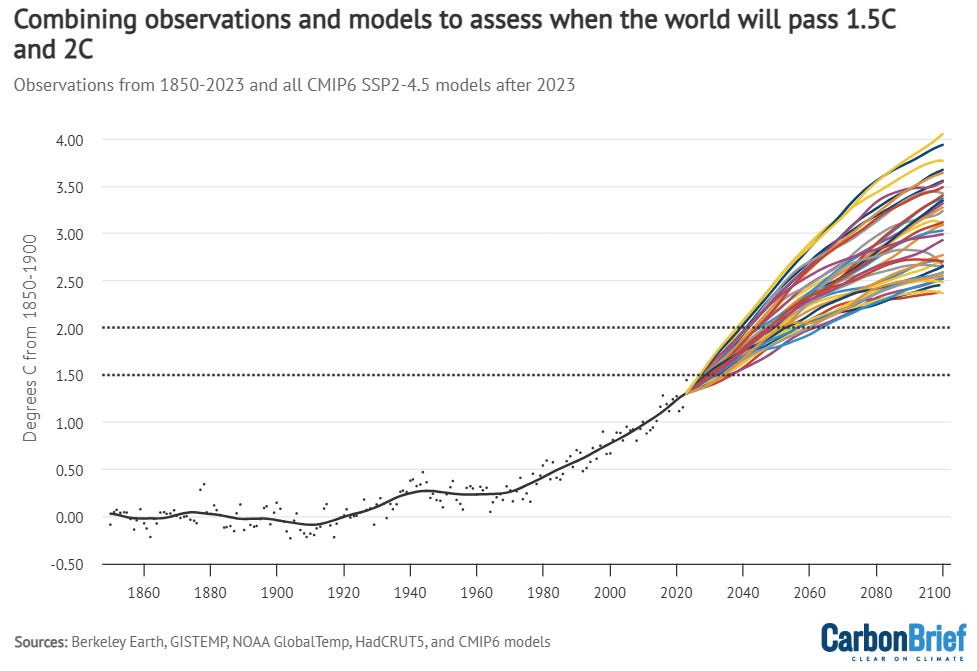1.5°C When?
This is the future fossil fuel companies and their conservative brethren want.
About ten years ago, back in 2015, all 195 countries of the world signed the Paris Agreement, in which the nations agreed to limit global warming due to anthropogenic climate change to "well below" 2°C above pre-industrial levels and to make efforts to keep it below 1.5°C. These agreed limits were aimed for the year 2100, two or three generations in the future, around 75 years from now.
In June, NASA reported that all of the last 12 months had set temperature records, and 11 of them surpassed the 1.5°C mark. The average global temperature from June 2023 to May 2024 was 1.63°C above the pre-industrial level. Today, mind you — not as foreseen by politics and climate science at some point in the future in the year 2100.
The IPCC calculates the relevant global average temperature, which the Paris Agreement is based on, using a 20-year average; with the drawback that it only becomes definitively known after 10 years whether and when we reach and exceed certain values and limits. However, there are statistical alternatives that give more weight to values closer in time, allowing us to make meaningful statements today about whether and when certain values will be reached.
Carbon Brief has applied such alternative statistical methods to global temperature values from different datasets and calculated when we will approximately reach and exceed the non-binding global warming limits of the Paris Agreement.
Spoiler alert: It is not in the year 2100, nor a few years before that:
(Our) approach suggests that the world will pass 1.5C around the year 2030 (representing the 50th percentile, or central estimate, of all the model runs), with a range of anywhere from 2028 (5th percentile) up to 2036 (95th percentile).
Similarly, the world will pass 2C around the year 2048, with a range of 2040 to 2062 across all models assessed.
To be clear: The global limits targeted in the Paris Agreement will be reached in about 10 and 25 years respectively according to this statistical method, not in 75 years. And ofcourse: We can go way above those limits, easily, just give it enough time.
At the same time, a report by consulting firms KPMG and Kearney finds another record consumption of fossil fuel energy in 2023, which rose by 1.5% from the previous year's level. On track.
Meanwhile, climate policy worldwide is being weakened, conservative politicians pretend to be clueless in the face of flood disasters, and climate activists end up in jail for trivial offenses and civil disobedience. In Mecca, over 1,000 people die during the Hajj, where temperatures have been over 50°C for days, U.S. cities like Phoenix and New Orleans reach life-threatening temperatures despite prevailing air conditioning, and New Delhi sets a new temperature record for India at 52.3°C degrees — with over 100 deaths so far. These are just some few headlines from the past days, i have an extreme weather markdown file containing dozens of them for this year alone. A UN survey of 75,000 participants from 77 countries found that concern about climate change has "never been greater."
When, ten years ago, we as a global community (of course completely non-bindingly) agreed to limit global warming due to human-caused climate change to 2/1.5°C by 2100 and to do everything possible to achieve it, the well-known climatologist and former NASA scientist James Hansen, who in 1988 was the first to warn the US Congress about the consequences of unchecked climate change, said the agreement was "a fraud, really," it was "bullshit" and "worthless words."
There is no action, just promises. As long as fossil fuels appear to be the cheapest fuels out there, they will be continued to be burned.
And as long as that is the case, we will set new temperature records every year, revise statistical projections, and mourn further fatalities. Nobody seen this coming.



